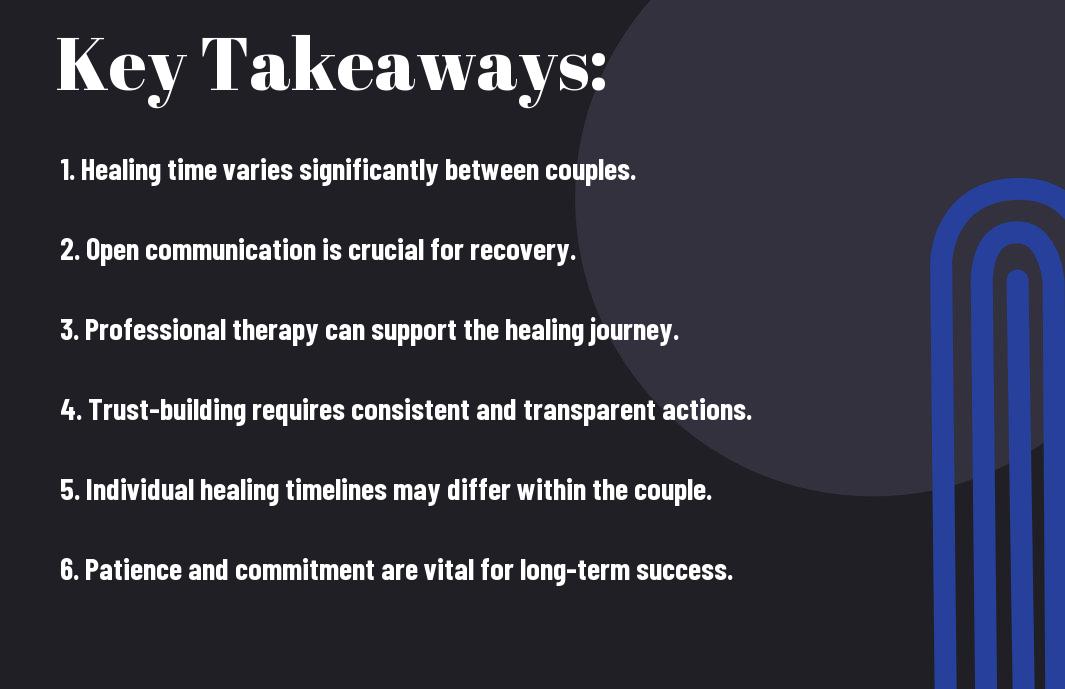There’s a profound journey ahead after experiencing infidelity, and understanding the healing process is important for your emotional recovery. Experts suggest that healing timelines vary significantly based on individual circumstances, the depth of emotional connection, and the steps taken towards rebuilding trust. While some may find themselves in a longer recovery period, others can navigate through the aftermath more swiftly by prioritizing open communication and self-care. This post will explore insights from relationship specialists to help you gauge what to expect as you work toward healing your relationship and yourself.
Key Takeaways:
- Healing from infidelity is a highly individual process that can vary significantly based on the couple’s unique circumstances.
- On average, couples may require anywhere from six months to two years to fully heal and rebuild trust after an affair.
- Effective communication and openness are vital components in the healing process, allowing partners to express feelings and concerns.
- Seeking professional help, such as couples therapy, can provide guidance and support for both partners during this challenging time.
- Both individuals in the relationship must take responsibility for their roles in the situation to facilitate healing and growth.
- Forgiveness does not happen overnight; it is a gradual process that requires time, understanding, and effort from both partners.
- Establishing new patterns of behavior and building a stronger foundation can help couples create a healthier and more resilient relationship post-infidelity.

Understanding Infidelity
Before delving into healing, it’s crucial to understand the phenomenon of infidelity. This complex issue often results in emotional turmoil for all parties involved and varies based on individual circumstances. Recognizing the layers behind this betrayal can pave the way for recovery and rebuilding trust.
Definitions and Types of Infidelity
Before healing can begin, it’s vital to define infidelity and its different manifestations:
| Emotional Infidelity | Forming a close emotional connection with someone outside your relationship. |
| Physical Infidelity | Engaging in sexual activities with someone other than your partner. |
| Cyber Infidelity | Using digital platforms for romantic or sexual interactions. |
| Romantic Infidelity | Developing a romantic relationship while in a committed partnership. |
| Situational Infidelity | Situations that arise, leading to an affair, often under unique circumstances. |
Perceiving these types can help you understand the patterns that led to the betrayal.
Psychological Impact on Partners
The ripple effects of infidelity can deeply impact your mental and emotional health. This betrayal can trigger feelings of inadequacy, anxiety, and anger, disrupting your sense of self-worth and security in relationships.
In addition to the initial shock, many partners experience heightened levels of depression, a struggle to rebuild trust, and a continuous battle with self-esteem issues. The emotional turmoil can lead to withdrawal from loved ones and a tendency to seek validation outside the relationship. Feelings of jealousy or comparison with the third party may persist, complicating your healing journey. Understanding these psychological effects can assist you in navigating your feelings and seeking appropriate support.

The Healing Process
Clearly, healing after infidelity is a unique journey for each individual and couple. It involves navigating through emotional turmoil, rebuilding trust, and fostering open communication. The process can take time and requires commitment from both partners to move forward. Engaging in honest conversations and seeking professional guidance can facilitate healing, ultimately allowing you to explore the possibility of a stronger relationship.
Phases of Recovery
Across the path to recovery, you may encounter various phases that will guide your healing process. Initially, you might experience shock and denial, followed by anger and grief. As you begin to process your emotions, you could enter a phase of reflection, where understanding the reasons behind the infidelity becomes imperative. Ultimately, acceptance and rebuilding can pave the way for a healthier connection.
Factors Influencing Healing Time
About the factors influencing healing time, several elements can play a significant role in your recovery process:
- The severity of the infidelity
- Individual emotional resilience
- Quality of communication between partners
- Support systems available
The emotional investment and willingness to work through challenges ultimately determine how quickly you can heal.
This journey is influenced by varying factors that can accelerate or delay progress. For instance, the severity of the infidelity impacts how deeply wounds are felt, while individual emotional resilience dictates your ability to cope and adapt. Additionally, the quality of communication between partners can either facilitate understanding or create further barriers. Establishing solid support systems can also greatly enhance the healing experience. The key lies in your commitment and readiness to confront the pain while seeking avenues for growth.
Expert Insights
Your healing journey after infidelity is complex and deeply personal. Experts in relationship dynamics emphasize the importance of understanding your feelings and the long-term implications of staying together. For a deeper exploration of this topic, check out Am I Crazy to Stay After My Partner Cheated? Experts Weigh …. This resource offers valuable perspectives that can guide you through this challenging process.
Therapist Perspectives
Along your path to healing, therapists often recommend open communication between partners to rebuild trust. They emphasize that recovery takes time and varies greatly from one couple to another, depending on factors like emotional investment and individual resilience. Therapy can provide a safe space to address feelings of betrayal and facilitate understanding.
Personal Stories of Healing
Against all odds, many individuals have found healing and renewed relationships after infidelity. These personal stories illustrate that with dedication and effort, couples can emerge stronger. Open dialogues about emotions and needs often pave the way for a healthier partnership.
Therapist reports highlight that sharing personal experiences can foster connection and empathy. You might discover that recognizing common feelings of pain, confusion, and eventual understanding can significantly enhance your healing journey. While each story is unique, many express that honesty and vulnerability were vital steps toward reconciliation, reminding you that hope and happiness can still flourish after betrayal.
Communication Strategies
All successful healing processes after infidelity hinge on effective communication strategies. You must create an environment where both partners feel safe and heard. This not only fosters understanding but also lays the groundwork for rebuilding trust. Open dialogue allows you to express your feelings, clarify misunderstandings, and collaboratively work towards healing.
Importance of Open Dialogue
Against the backdrop of betrayal, fostering open dialogue becomes imperative for both partners. You can actively choose transparency and vulnerability, which can significantly aid in healing wounds. This openness allows you to express emotions and concerns without fear, fostering a deeper connection and understanding.
Navigating Difficult Conversations
Around the topic of infidelity, difficult conversations are inevitable and necessary. You may feel apprehensive, but confronting the issues head-on is key to moving forward. You should allocate specific times to discuss your feelings, ensuring both partners are present and prepared to listen and understand.
Hence, navigating difficult conversations should involve active listening and a focus on solutions rather than blame. You must establish ground rules for these discussions, such as allowing each partner to speak without interruption and refraining from personal attacks. It’s important to approach these conversations with an open heart, recognizing the vulnerability both of you are experiencing. By doing so, you create a space where healing can take root, enabling both partners to feel validated and understood in their feelings and experiences.
Rebuilding Trust
After experiencing infidelity, rebuilding trust is important for moving forward in your relationship. This process requires transparency, consistent effort, and a willingness from both partners to work through the pain and hurt caused by betrayal. Addressing underlying issues and fostering open communication are key elements in restoring confidence in one another. As you navigate this journey, prioritize emotional safety and establish a foundation for a stronger connection.
Steps to Regain Trust
An important part of regaining trust involves openly discussing feelings, exhibiting accountability, and taking proactive steps to demonstrate your commitment. Start by acknowledging the impact of the betrayal and validating your partner’s emotions. Develop a plan together for repairing the relationship, setting achievable goals, and being patient with the healing process. Small, consistent actions will reinforce your dedication to mending the bond.
Setting Healthy Boundaries
To successfully rebuild trust, establishing healthy boundaries is vital. This involves defining what each partner needs to feel secure and respected moving forward. Create clear guidelines regarding communication, privacy, and social interactions to help minimize misunderstandings and nurture trust in your renewed relationship.
But establishing these boundaries requires open discussions and a keen understanding of your partner’s needs. Each person should express their comfort levels and concerns without judgment. Defining acceptable behaviors and discussing triggers can prevent past patterns from resurfacing. Ensure that both partners are willing to respect and adhere to these boundaries, allowing for a more secure and trusting atmosphere, ultimately paving the way for emotional healing.

When to Seek Professional Help
Not every couple needs therapy after infidelity, but seeking professional help can be valuable when communication breaks down, trust is severely damaged, or when the emotional pain feels overwhelming. If you and your partner find it difficult to discuss your feelings or make progress on your own, a therapist can provide neutral ground and guide you both through the healing process. Taking that step can be vital in finding pathways toward reconciliation or closure.
Signs of Strain in the Relationship
Between escalating arguments, ongoing resentment, and a sense of emotional distance, signs of strain may indicate that your relationship is suffering in the aftermath of infidelity. If you notice frequent misunderstandings, avoidance of important conversations, or a lack of intimacy, these can be telltale signs you and your partner may benefit from addressing the underlying issues together with a professional.
Benefits of Couples Therapy
About engaging in couples therapy can offer transformative advantages for your relationship, especially following an infidelity. With the support of a trained therapist, you can explore your emotions in a safe environment, learn effective communication strategies, and work toward rebuilding trust. This structured setting fosters understanding and promotes healing, helping you both navigate the complexities of your feelings and find a path forward.
Indeed, couples therapy can be a game-changer for your relationship, enabling you to address deep-seated issues while also fostering open communication and emotional safety. This therapeutic support allows you to unpack the emotional consequences of infidelity and gain a clearer perspective on each other’s needs. Through guided sessions, you can cultivate new relational skills, easing both partners’ paths towards forgiveness and rebuilding. Ultimately, the therapy process can lead to a deeper understanding and a renewed commitment to your relationship, helping you create a stronger, more resilient bond.
To wrap up
As a reminder, healing after infidelity is a highly personal journey that varies for each individual and couple. Generally, you can expect the process to take anywhere from a few months to several years, depending on factors like the depth of the betrayal, the willingness to communicate, and your commitment to rebuilding trust. By seeking professional guidance and focusing on your emotional health, you can navigate this challenging period and work towards a healthier relationship moving forward.
FAQ
Q: What factors influence the healing time after infidelity?
A: The healing process after infidelity can vary widely and is influenced by several factors. These include the nature of the betrayal, the level of emotional connection between partners, individual coping mechanisms, communication skills, and the willingness of both partners to work through the pain. Additionally, the length and depth of the relationship prior to the infidelity, as well as external support systems, can also play significant roles in determining how quickly healing occurs.
Q: Is it possible to heal from infidelity without professional help?
A: While some couples may successfully navigate the aftermath of infidelity on their own, many find that professional help, such as couples therapy, can provide invaluable support and guidance. A therapist can help facilitate open communication, encourage empathy, and provide tools to rebuild trust and connection. For couples willing to put in the effort, therapy can expedite the healing process and lead to a stronger relationship.
Q: How can both partners contribute to the healing process after infidelity?
A: Both partners play important roles in healing after infidelity. The partner who cheated must demonstrate accountability and a willingness to change behaviors that led to the betrayal. Open and honest communication is vital. The betrayed partner should express their feelings openly and set boundaries for their healing journey. Mutual support, patience, and understanding are key components, as each partner needs to feel validated in their emotions during this challenging time.
Q: What are the stages of healing one might experience after infidelity?
A: The healing process after infidelity typically involves several stages. Initially, there is shock and denial, followed by feelings of anger and betrayal. This may be followed by a period of sadness as the reality of the situation sets in. Eventually, couples may enter a phase of reflection, where both partners reassess their relationship and the commitment to move forward together. Acceptance and reconciling the relationship can occur, allowing for rebuilding trust and intimacy. Each person’s journey through these stages varies, and healing is not always linear.
Q: How long should one expect the healing process to take?
A: Healing from infidelity is not a set time frame and can vary significantly for each couple. Generally, experts suggest that healing can take anywhere from a few months to several years, depending on the factors discussed previously. It’s important for both partners to be patient with themselves and each other, recognizing that healing is a process that requires effort and commitment. Continuous evaluation of progress and open dialogue can aid in the healing timeline.
